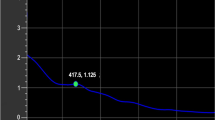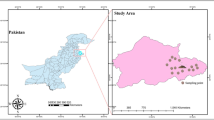Abstract
THE toxic substance of L. sativus responsible for lathyrism has been identified as selenium. L. sativus is much richer in selenium content than other pulses which are harmless (see table). Selenium has been estimated after wet incineration of the dried substance and reduction with ascorbic acid, which is a stronger reducing agent than hydroxylamine used by Klein1. Owing to the higher degree of utilization of L. sativus (Jiménez Díaz and Romeo2 observed 86 per cent utilization) the high selenium content is easily transported to the tissues.
This is a preview of subscription content, access via your institution
Access options
Subscribe to this journal
Receive 51 print issues and online access
$199.00 per year
only $3.90 per issue
Buy this article
- Purchase on Springer Link
- Instant access to full article PDF
Prices may be subject to local taxes which are calculated during checkout
Similar content being viewed by others
References
J. Assoc. Off. Agric. Chem., 24, 363 (1941).
Rev. Clin. Espanola, 8, 244 (1943).
Res. Pub. Assoc. Nerv. Ment. Dis., 13, 158 (1934).
J. Nerv. Ment. Dis., 96, 493 (1942).
Can. Med. Assoc. J., 31, 376 (1934); 32, 379 (1935).
Lancet, i, 688 (1946).
Curr. Sci., 21, 99.
J. Biol. Chem., 179, 487 (1949).
Indian Med. Gaz., No. 3 (March 1952); J. Asiatic Soc. Bengal, 82, 89.
Author information
Authors and Affiliations
Rights and permissions
About this article
Cite this article
RUDRA, M. Toxic Principle of Lathyrus sativus. Nature 170, 124–125 (1952). https://doi.org/10.1038/170124b0
Issue Date:
DOI: https://doi.org/10.1038/170124b0
This article is cited by
-
An investigation of processing and consumption of pulses among prehistoric societies: archaeobotanical, experimental and ethnographic evidence from Greece
Vegetation History and Archaeobotany (2011)
-
Lathyrismus
F�hner-Wielands Sammlung von Vergiftungsf�llen Archiv f�r Toxikologie (1961)
Comments
By submitting a comment you agree to abide by our Terms and Community Guidelines. If you find something abusive or that does not comply with our terms or guidelines please flag it as inappropriate.



